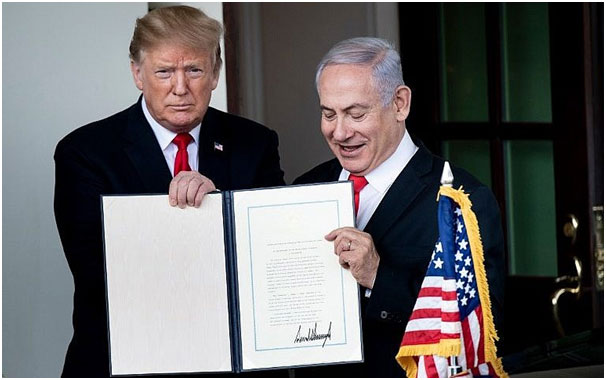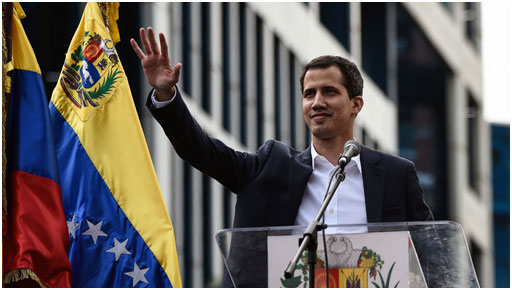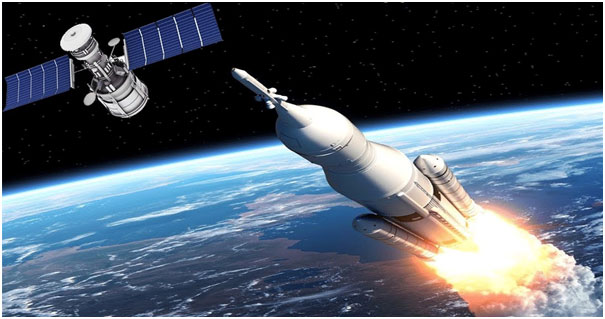
Iran's president, Hassan Rouhani denounced Donald Trump's recognition of Golan Heights as the sovereign part of Israel. This comes after many Arab nations, many of which are the allies of the United States, condemned the decision of the American government. The move came after Benjamin Netanyahu's visit to the United States, and is seen by many as a political boost for the upcoming elections in Israel.
Golan Heights was annexed by Israel in the year 1967 and since then it has remained an issue between Syria and Israel. Iran and the United States already have tensions between them following the withdrawal from the Iran Nuclear deal by the United States, as well as Iran's support to Syria and anti-Israel militant groups, including the Hamas and the Hezbollah. Iran also urged the Palestinians to resist this move, calling Israel's occupation, of both Palestine and the Golan Heights, a part of 'an illegitimate Zionist regime'.
This move also hampers Donald Trump's idea of a 'peaceful Middle East', with many pointing out the change in American policy towards this issue. This is not, however, the only time a shift in the American policy has occurred. Only recently the Trump administration announced the shifting of the American embassy from Tel Aviv to Jerusalem, thereby legitimizing it as the capital for Israel, which is yet another bone of contention between Israel and Palestine.
On Monday, the Venezuelan Government decided to ban Guaido from holding or contesting any public office for 15 years. A move caused more uncertainty for Venezuela to have any rest in the undergoing political crisis,Guaido had declared himself the interim President of the country in January after invoking the Constitution.
President Maduro has cracked down hard on the US-backed Guaido, who he claims as a usurper to his position. Maduro is also facing a monumental task of bringing economic reforms in the country as Venezuela is facing hyperinflation for the past three years. Guaidohas been barred from the public office on the pretext that he has received funds illegally from domestic and international sources.

The government is also trying to put up an arrest warrant for Guaido, Maduro is under immense pressure and the move is a desperate attempt to suppress his popular rival. If the arrest warrant goes through then officially Guaido's immunity willbe stripped off him. The political instability in the country is not the only issue as the shortage of power in the major cities of the country even the capital Caracas.
The recent developments in the crisis puts the country in dire need of a miracle and with the US sanctions not going to be removed soon and the tussle between Maduro and Guaido which is backed by major countries.

On 27 March, India announced to the world about her successfully carrying out the anti-satellite missile test. Thenceforth, India joined the space "super league" becoming the fourth country to possess such capability as ASAT. Earlier the US, Russia and China have successfully carried out such operations into space. The US and the then Soviet Union carried out such operations during the heydays of the Cold War in the 1970s. However, no country has brought down the satellite of other countries, either due to war, conflict or by mistake. Taking it into account, all media platforms across India were flourished with stories showcasing it as a giant technological and strategic development for the country. Keeping the general elections around the corner, Prime Minister Modi and his party in power, left no stone unturned in appealing all senses of the public to their governments endeavor for such a great success. PM Modi himself took over the television to make the announcement, which proved quite tempting not only to the Indians but also to the people around the world.
Taking into notice, today's competitive scenario, where we are using space and satellites for maximizing precision in agriculture, communication, defense, meteorology, navigation, disaster management, medical purposes, etc. Thus, having an Anti-Satellite Missile further waxes the security of all sorts of satellites serving myriad purposes, an extremely valuable asset. In simpler words, ASAT stands for Anti-Satellite Missile Test, which is the technological capability that allows to destroy and hit satellites in space with precision through missile being launched from the ground. The operation was carried at 9:27 a.m. local time in India, at Defense Research and Development Organization (DRDO) from the A P J Abdul Kalam island launch complex near Balasore in Odisha. The missile successfully stuck the predetermined target with crystal precision. The target made was a redundant Indian Satellite, orbiting at a distance lower from the Earth's surface.
The gesticulations of discontent aroused from many countries including the US post India's successful operation. The discontents are primarily rooted in the problem of space debris, which is result of such tests. However, to this claim Ministry of External Affairs has made it crystal clear that India carried out the mission in Earth's lower atmosphere leaving no debris into space. The debris generated in this space falls back on the Earth surface after a while.
For the security of the region- A Strong India is crucial. The operated has been strongly echoed by PM and MEA as "Mission Shakti", adding a feather to Indian cap. India's strategic goal is to ensure peace. The mission has been reiterated as a "defensive" move, keeping India's space security intact. India strong opposition posture towards weaponization of space remains her priority. Her firm stand to international efforts to boost the safety and security of space-based assets shows positive signs of development.
Image Source: Times of Israel, MPR News, DRDO news